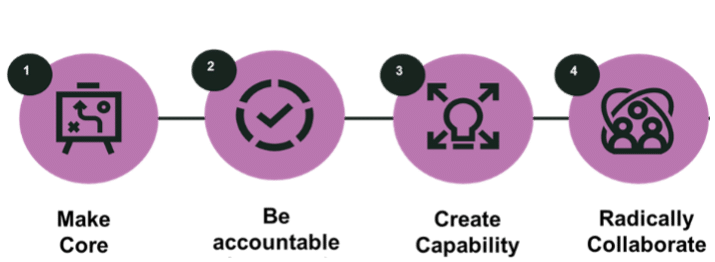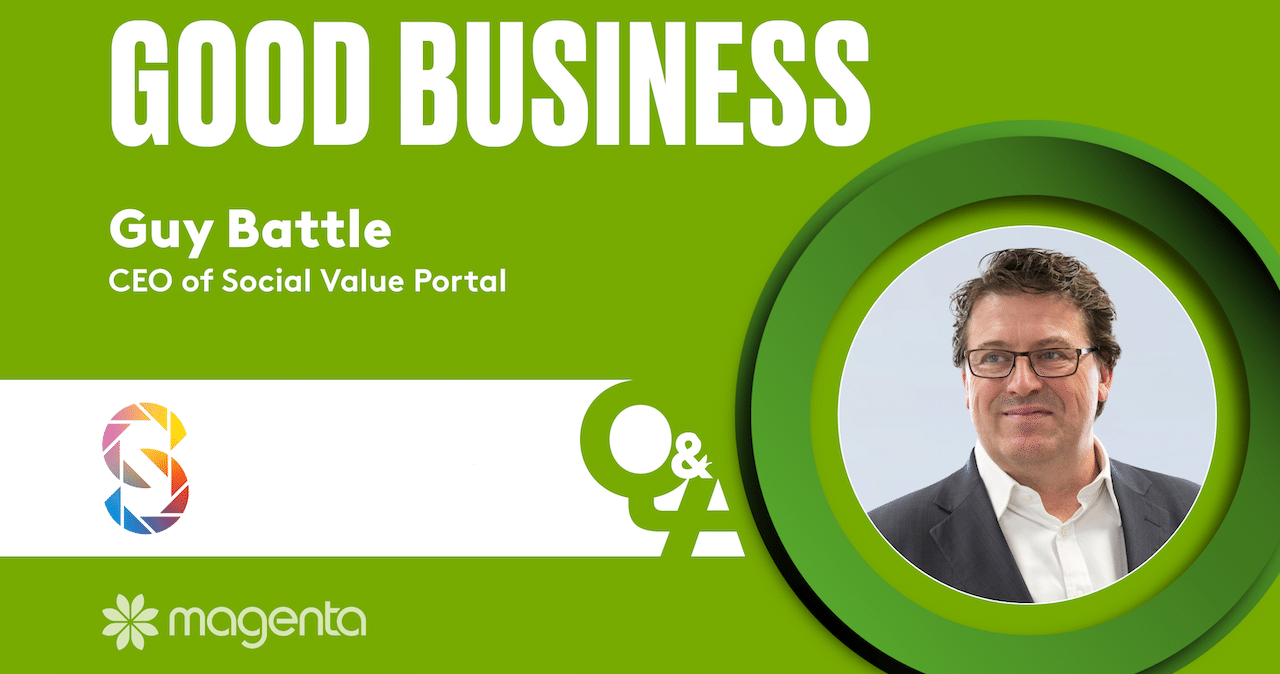In this interview for our Good Business campaign I spoke with Guy Battle, CEO at Social Value Portal (SVP). We discussed how Social Value has increased in prominence in recent years, how businesses can integrate it into their decision-making, and the importance of avoiding misleading claims and language.
Tell me about your background and Social Value Portal.
My background is in building engineering, and I started my career designing sustainable solutions for the built environment, first with Arup, and then with a business called BattleMcCarthy.
I then set up dcarbon8in 2006 as a platform for supporting decarbonisation with a focus on embodied carbon – a long time before this was a big topic. It was acquired by Deloitte in 2010, and I spent four years there building its assurance and carbon reporting team. At that point, I was ready to take a break from the corporate world.
I reached out to Rt Hon Hazel Blears, as she had been working with Chris White MP on taking the Public Services (Social Value) Act through Parliament. I carried out a review of the Act to see how it was being received and found that most organisations were struggling to apply it, as there was little guidance and no support with implementation.
And so, with my engineering hat on, I saw that we needed a measurement framework which could be used in both procurement and reporting. That’s when I developed the Social Value TOM System TM (Themes, Outcomes and Measures).
This happened over a period of 18 months via conversations with both buyers and providers, through the National Social Value Taskforce. We published the framework in 2017, although I’d kicked off SVP in 2015 with a procurement pilot project with Lambeth Council.
We’ve since grown to about 120 employees, with offices in London and Manchester. The platform is at the centre of what we do, with a wraparound consultancy business.
How has Social Value developed over time, and what are the alternative ways small and large businesses can prove their commitment to Social Value?
I started working on sustainability in 1993. It’s since become part of Environmental, Social, and Governance (ESG), but probably didn’t become a mainstream idea until the mid-2010s.
Social Value as a concept emerged in the early 2000s but entered the public sector consciousness around 2013 with the Social Value Act. In the decade since, it has gone from nowhere to everywhere. Why has it gained traction so much faster than sustainability? Legislation like the Social Value Act certainly helps; there wasn’t any for sustainability for a long time.
Thanks to the Act, Social Value took hold in public sector procurement, and the private sector has had to respond. The weighting for Social Value in tenders can be as high as 30%, so it’s as good as mandatory to demonstrate Social Value. In this sense, legislation has been transformative.
A lot of smaller organisations think that they cannot ‘do’ Social Value. But the truth is that they are probably already doing it, and in many cases might be doing it much better than the big organisations.
The TOM System was specifically designed with this in mind – to level the playing field for all businesses. It is made up of a series of simple Measures (tasks) such as employing local people, spending in a local supply chain, supporting local schools, or saving carbon. All of these can be done by a small business and because the procurement process is related to the actual project or service being bought, you have access to the same resources whether you are big or small.
I liken it to two people going into a restaurant. One person is very rich and one person less so – but the rules of the game are that they have the same budget and cannot spend more, even though one person might be richer. This is what levelling up is all about.
A great example is from when Social Value Portal was still quite small. We employed an ex-offender through a programme which helped find work for this demographic, which often struggles to enter employment. This was something we could do as a small business which had a big Social Value impact.
How can procurement promote diversity within a supply chain? What are the steps involved in identifying, partnering and collaborating with environmentally and socially conscious suppliers?
The procurement stage is where the buyer has the best opportunity to negotiate, because many suppliers will go the extra mile to win the job.
Public sector organisations are bound by the Procurement Act, and there are strict rules around tendering. However, in the private sector you can essentially create your own rules. Many of these are likely to be screening rules, so it’s easy to screen out, or incentivise, organisations that are more socially aware.
As an example, we do a lot of work with Nuneaton Signs. 72% of its employees are registered disabled, and the company ensures that they have all the support they need. Many of these employees might struggle to find a job otherwise. Nuneaton Signs consistently wins a lot of work, because the companies that hire them know that they are sustaining jobs for this group.
If you are a buyer, you need to build capacity and capability into their supply chain ahead of time; otherwise suppliers won’t be able to deliver. You need to build their understanding and capability. In the public sector this is called pre-market engagement, and there is a similar process in the private sector. The more notice you give potential suppliers ahead of procurement, the easier it will be for them to embed Social Value into the contract without adding cost.
How can businesses integrate social value performance into decision-making?
The problem with Corporate Social Responsibility (CSR) is that it has always been seen as an add-on. It might account for 1% of a business’s activity, with the focus being on maximising that time in a way that can be positively reported on.
If you’re really going to deliver Social Value, you need to integrate it into the culture of the business, including your supply chain.

With recruitment, recruit local people, people who are disabled, or people from minority groups. If you integrate this into your processes, it won’t cost more, and will add Social Value. Sodexo is a great example, as is Nuneaton Signs.
What should be the Board of Directors (or equivalent) role in reviewing social performance?
The board should lead it from the top, with someone specifically in charge of Social Value. Five years ago, there were no Social Value roles, and now I’m being asked to recommend people for Social Value roles all the time.
At a recent lunch I was sitting next to a recruiter who had been in Abu Dhabi for the last few years and was working in sustainable recruitment. I asked if they did Social Value recruitment and the person said no. I told them that whilst they had been in Dubai, the landscape in the UK has transformed, and their business would be doing Social Value recruitment here in the UK. They just didn’t know about it yet.
I am seeing roles like Director of Social Value Solutions, or Social Value Architect. We have people poached from Social Value Portal all the time!
How can businesses engage stakeholders and employees about social performance, and get them onboard as ESG ambassadors?
I was on a webinar recently with someone from Lloyds Bank. They said that young people always want to know about their CSR policies, and that it plays a big role in their decision on which company to join.
Employees want a sense of purpose. CSR and Social Value is massive for retention and motivation, which ultimately enhances productivity. The more you can engage with buyers, suppliers, and stakeholders, the better.
How do you avoid vague or misleading language, making false claims, cherry picking data, etc?
We’re all about helping our customers avoid ‘’social washing’’ and it’s therefore critical to be transparent, report, provide, and validate the evidence. We validate all claims by our customers and our system provides a digital trail to ensure that information used in any annual report is accurate and can be audited. This is essential; otherwise, you get claims that are only skin deep and not backed up by evidence.
I get deeply suspicious of annual reports where there are more pictures of kids planting trees than real data. It is, of course, really important to create a narrative, and bring the stories alive with real people. But this must be backed up by audited data, otherwise it’s just ‘fluff’.
In my view, every business should do an annual Social Value or Impact report. It should describe their impact in terms of both ‘value created’ and the wider support for people, place and planet. It should include clear performance metrics and say what they are not reporting too.
I’d also like to see every organisation setting their own Social Value targets, like many organisations already do around net zero. Businesses could set themselves a three-year plan for delivering Social Value, for example, using the TOM System to support the plan. We have our own target to unlock £100 billion of Social Value by 2026 – we call this our BAG (Big Audacious Goal).
The construction company Wates is a good example of setting Social Value targets. It recently was able to secure preferential rates for a loan because it has a target of delivering £230m of Social Value within the three years of the loan agreement. It is being measured and if it does not meet the target, it will pay higher interest rates. I’m not saying every business needs to do this, but no one is being judged for trying, so be honest and transparent.
How do businesses create a safe space that champions diversity and supports diversity of thought? What practices promote diversity, equity, and inclusion?
At Social Value Portal, we have our own Equality, Diversity and Inclusion group of 10-12 people – about 10% of the business. The group has been set up to explain and promote diversity of thought in its widest sense and create ‘safe spaces’ for discussion. I have no doubt that many of us are burdened by wide range of unconscious biases, so it is great to be able to explore these in a space where you avoid offence.
We also celebrate events such as Black History Month and Pride, and make a proper effort to genuinely recognise these important awareness events. When celebrating Black History Month, we invited people to talk about their heritage. It was fascinating to hear about their experiences of racism, and how they get challenged just for the colour of their skin. This is something that many of us have not been through and so have no concept of, but it really helps to hear other people’s experiences.
Follow our Good Business campaign
More information the Good Business campaign is available on our website.
The previous nine interviews in the series are available to read on our website:
- Amy Brogan Q&A
- Simon Joe Portal Q&A
- James Banks Q&A
- John Hamilton Q&A
- Sally Leigh Q&A
- Alistair Blackmore Q&A
- Adam Jones Q&A
- Lizzie Neave and Mel Taylor Q&A
- Terry Mills Q&A
If you’d like to find out more or talk about how you and your business can get involved, email me on jo@magentaassociates.co.








